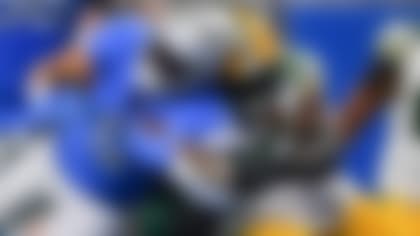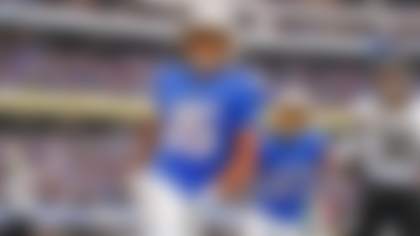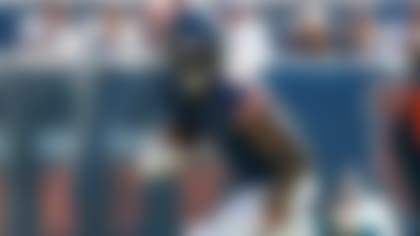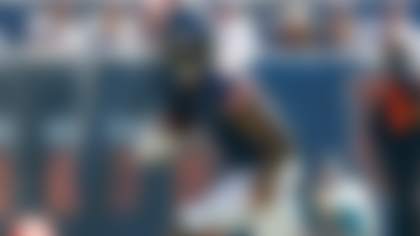Super Bowl LV's in the books, bringing an unprecedented NFL season to a close. So, how did the new guys perform in this uniquely challenging 269-game slate?
Over the past couple weeks, NFL.com rolled out division-by-division files featuring grades for each team's rookie class, with Gennaro Filice and Nick Shook sharing the evaluation duties. Upon completion of this series, Filice and Shook had a meeting of the minds to officially rank every group, from 1 to 32. Here's the pecking order:
Round 2
- (No. 34) Michael Pittman Jr., WR, 13 games/8 starts
- (41) Jonathan Taylor, RB, 15 games/13 starts
Round 3
- (85) Julian Blackmon, S, 15 games/14 starts
Round 4
- (122) Jacob Eason, QB
Round 5
- (149) Danny Pinter, OG, 13 games/1 start
Round 6
- (193) Robert Windsor, DT, 2 games
- (211) Isaiah Rodgers, CB, 13 games
- (212) Dezmon Patmon, WR, 1 game
- (213) Jordan Glasgow, LB, 13 games
Notable Undrafted Free Agent
- Rodrigo Blankenship, K, 16 games
FILICE: Halfway through his rookie campaign, Taylor was a disappointment, running indecisively to the tune of just 3.8 yards per carry over his first nine games. But he seemed to find his NFL footing around Thanksgiving, and over the final seven weeks of the regular season, there wasn't a better NFL running back this side of Derrick Henry. Taylor averaged a healthy 6.2 yards per carry in this span, carrying Indianapolis into the playoffs with a franchise-record 253 rushing yards in a Week 17 win over Jacksonville. Standing 5-foot-10, 226 pounds with 4.39 speed, Taylor's a load to bring down and a constant home run threat. In Year 1, he alleviated two major pre-draft concerns -- ball security and receiving skills -- with only one fumble and one drop in the regular season. (Though he did drop two passes in the wild-card loss to Buffalo. Playoff debut jitters?) In an RB era defined by specialization and committee usage, Taylor looks like the rare bell cow. One potential concern for Colts brass and humanity at large: Taylor might have manipulated some kind of midseason body swap with Blackmon, given how antithetically their respective debut campaigns played out. By midseason, Blackmon had surprisingly thrust himself into the Defensive Rookie of the Year conversation as a ball-hawking playmaker. But in the stretch run, right when Taylor was taking off, Blackmon appeared to hit a rookie wall. Supernatural factors must be considered. And potentially feared. Pittman -- Indy's top selection who missed three games with an unsettling creeper of a leg injury -- was a pretty consistent producer. The big-bodied wideout is quite spry after the catch, and he knows how to use his 6-4, 220-pound frame as a run blocker, to boot. (Just ask noted tough guy Johnathan Abram, who ate a Pittman pancake on this Colts touchdown.) With a well-rounded game, Pittman feels like a Year 2 breakout candidate, depending on what Indy does at the quarterback position. The cherry on top of another fine draft haul for Chris Ballard: special teamers Rodgers, Glasgow and Blankenship all joining Taylor on the PFWA All-Rookie Team.
Round 1
- (No. 13) Tristan Wirfs, OT, 16 starts
Round 2
- (45) Antoine Winfield Jr., S, 16 starts
Round 3
- (76) Ke'Shawn Vaughn, RB, 10 games
Round 5
- (161) Tyler Johnson, WR, 14 games/3 starts
Round 6
- (194) Khalil Davis, DL, 2 games
Round 7
- (241) Chapelle Russell, LB, 11 games (now w/ JAX)
- (245) Raymond Calais, RB, 4 games (w/ LAR)
SHOOK: The Buccaneers nailed their first-round pick, making Wirfs the fourth tackle taken in the opening round and ending up with the best of the rookie class. Wirfs made the PFWA All-Rookie Team after starting all 16 games and grading out as one of the top eight tackles in the entire NFL, per Pro Football Focus. The Buccaneers needed a rock-solid right tackle after letting Demar Dotson walk in free agency and found their man in Wirfs. Winfield was another stud for Tampa Bay, starting all 16 games and showing up against the ground game, recording the third-best run defense grade among safeties. He can improve in coverage, but compiled a very promising first NFL season. Vaughn got lost in a crowded running back room that also included Ronald Jones, Leonard Fournette and LeSean McCoy, but if he can hang around long enough, he might be able to prove he was worth the pick. Johnson was another youngster who was buried by more senior teammates at his position, but when Antonio Brown exited in the Divisional Round, Johnson stepped up to make a timely catch on a key possession in the Buccaneers' upset win at New Orleans. Johnson looks like he might prove to be a great value pick as time progresses and the Bucs need to look down their depth chart for contributors, as he displayed upside in his small windows of opportunity. Davis didn't see much playing time, but did receive 18 defensive snaps in Tampa Bay's wild-card win over Washington. Russell played a handful of special teams snaps after a midseason promotion from the practice squad, and was eventually waived, landing with Jacksonville in early January. Calais was a cutdown-day casualty, ending up on the Buccaneers' practice squad for four days before the Rams signed him.
Round 1
- (No. 1) Joe Burrow, QB, 10 starts
Round 2
- (33) Tee Higgins, WR, 16 games/14 starts
Round 3
- (65) Logan Wilson, LB, 12 games/2 starts
Round 4
- (107) Akeem Davis-Gaither, LB, 16 games/2 starts
Round 5
- (147) Khalid Kareem, DE, 16 games
Round 6
- (180) Hakeem Adeniji, OT, 15 games/5 starts
Round 7
- (215) Markus Bailey, LB, 11 games
SHOOK: The Bengals nailed their first two picks of the 2020 NFL Draft, selecting a special talent who might very well be capable of transforming the franchise in Burrow. The only negative was that we didn't get a full season from him due to a season-ending knee injury. Higgins turned out to be a stud as a rookie, catching 67 passes for 908 yards and six touchdowns. He looks to be an ideal replacement for A.J. Green in the future. Wilson was Cincinnati's first attempt at addressing its linebacker need and he played well. He was the Bengals' top linebacker in PFF's grading system and landed among effective defenders like Bills linebacker Matt Milano. Wilson and Davis-Gaither each registered a couple starts -- Wilson would have finished with more if not for injury -- and also played a healthy amount of special teams. Kareem saw time in a rotational role, and Adeniji played significant snaps in three games as Cincinnati worked through its offensive line issues. Bailey primarily played special teams as a rookie.
Round 1
- (No. 22) Justin Jefferson, WR, 16 games/14 starts
- (31) Jeff Gladney, CB, 16 games/15 starts
Round 2
- (58) Ezra Cleveland, OG, 13 games/9 starts
Round 3
- (89) Cameron Dantzler, CB, 11 games/10 starts
Round 4
- (117) D.J. Wonnum, DE, 14 games/2 starts
- (130) James Lynch, DT, 9 games
- (132) Troy Dye, LB, 11 games/5 starts
Round 5
- (169) Harrison Hand, CB, 14 games/1 start
- (176) K.J. Osborn, WR, 9 games
Round 6
- (203) Blake Brandel, OT
- (205) Josh Metellus, S, 15 games
Round 7
- (225) Kenny Willekes, DE
- (244) Nate Stanley, QB
- (249) Brian Cole, S (w/ MIA)
- (253) Kyle Hinton, OG
Notable Undrafted Free Agent
- Blake Lynch, LB, 4 games/1 start
FILICE: How impressive was Jefferson's rookie campaign? Impressive enough to make the Vikings feel just fine about trading away Stefon Diggs and watching him immediately lead the league in catches and receiving yards. Yes, this was the elusive win-win trade. Diggs wasn't happy in Minneapolis -- the city where he produced a miracle -- so Minnesota flipped him for a pick package that included No. 22 in last April's draft. In that slot, the Vikes took the fifth receiver in Round 1, Jefferson, who broke Anquan Boldin's rookie record with 1,400 receiving yards on the dot. And just last week, the tireless tape munchers over at Pro Football Focus -- who apparently have a mischievous troll streak that this writer can't help but appreciate -- slapped Jefferson at No. 15 on their ranking of the top 101 players from 2020, exactly one spot ahead of Diggs. Mwah! Minnesota's second first-round pick didn't work out nearly as well as the first. Gladney started 15 of 16 games for the Vikings, and while he flashed proficiency as a physical cover man in certain matchups, consistency was a major issue, as evidenced by his 124.7 passer rating against, per PFF. Fortunately, Minnesota doubled down on this position of extreme need and found a quality corner in the back half of the third round, as Dantzler proved that a bad 40-yard dash in Indy doesn't define a man. Though injuries limited him to 11 games, Dantzler earned a spot alongside Jefferson on the PFWA All-Rookie Team. The Vikings also got some quality production from this class in the trenches, with Cleveland capably starting nine games at right guard and Wonnum notching three sacks and nine QB hits as a rotational pass rusher. Rick Spielman had the most bites at the 2020 draft apple with an NFL-high 15 picks, though the vast majority of them occurred on Day 3. Still, he was able to net quality contributors in multiple areas of need.
Round 1
- (No. 10) Jedrick Wills, OT, 15 starts
Round 2
- (44) Grant Delpit, S
Round 3
- (88) Jordan Elliott, DT, 16 games/1 start
- (97) Jacob Phillips, LB, 9 games/3 starts
Round 4
- (115) Harrison Bryant, TE, 15 games/9 starts
Round 5
- (160) Nick Harris, C, 12 games/1 start
Round 6
- (187) Donovan Peoples-Jones, WR, 12 games/2 starts
SHOOK: The Browns were in desperate need of a legitimate left tackle, and in a draft full of them, they landed one of the top two, if not the best. Wills made the PFWA All-Rookie Team after a very solid season protecting Baker Mayfield's blind side. While he'll need to improve his run blocking, Wills figures to be Cleveland's starting left tackle for years to come. Delpit could have answered a huge question at safety, but an Achilles tear ended his season in camp. He looms as a promising prospect, should he return to form in 2021. Elliott was a rotational defender stuck behind two very good defensive tackles (Sheldon Richardson, Larry Ogunjobi) but still made a few plays. Phillips showed flashes but hasn't yet filled Cleveland's dire need for linebacking talent. Bryant was the No. 3 tight end in a deep group, yet he managed to find his own niche, catching 24 passes for 238 yards and three touchdowns. He'll need to work on his tendency to drop a pass here and there, but the Browns landed a steal in Bryant, who also made the All-Rookie Team. Harris filled in at guard when the Browns battled losses to injury and COVID-19. He impressed before suffering an injury. He's a player who can grow into an effective lineman in the future. Finally, Peoples-Jones was another steal in the sixth round, filling out Cleveland's receiving corps and stepping in to help replace Odell Beckham. His most memorable grab -- a 24-yard catch along the boundary for the game-winning touchdown in Week 7 -- made him an instant fan favorite in Cleveland.
Round 1
- (No. 6) Justin Herbert, QB, 15 starts
- (23) Kenneth Murray, LB, 16 starts
Round 4
- (112) Joshua Kelley, RB, 14 games
Round 5
- (151) Joe Reed, WR, 11 games
Round 6
- (186) Alohi Gilman, S, 15 games/1 start
Round 7
- (220) K.J. Hill, WR, 15 games
SHOOK: The Chargers made their most important pick of perhaps the next decade with Herbert, who wasn't just an excellent rookie -- he was a fantastic quarterback overall. Murray needs to improve in coverage, but he wasn't the only rookie linebacker victimized by the league's increase in offensive output in 2020. He should make a relative leap in Year 2, his first under new head coach Brandon Staley. Kelley stepped up to help fill the void left by the injured Austin Ekeler, logging more than 500 scrimmage yards and scoring two touchdowns on 134 touches. Reed contributed mostly on special teams, while Hill saw more offensive snaps but at an inconsistent rate, totaling just 11 targets on the season. Gilman spent the majority of his rookie season on special teams, as well. The Chargers get a B+ largely because of their selection of Herbert, a choice that already appears to be a franchise-altering one, while Murray and Kelley still need some time to prove they were worth their picks -- especially Murray.
Round 1
- (2) Chase Young, DE, 15 starts
Round 3
- (66) Antonio Gibson, RB, 14 games/10 starts
Round 4
- (108) Saahdiq Charles, OT, 1 start
- (142) Antonio Gandy-Golden, WR, 6 games/2 starts
Round 5
- (156) Keith Ismael, C, 8 games
- (162) Khaleke Hudson, LB, 16 games/2 starts
Round 7
- (216) Kamren Curl, S, 16 games/ 11 starts
- (229) James Smith-Williams, DE, 14 games
Notable Free Agent Signee
- Casey Toohill, LB, 8 games (1 w/ PHI before release)
SHOOK: Washington had an easy choice at No. 2 overall and Young did not disappoint. The former Ohio State star made an immediate impact, assembling a Pro Bowl-caliber season that earned him the Defensive Rookie of the Year award at NFL Honors. Gibson emerged as Washington's best running back fairly early and did his greatest damage against division-rival Dallas, racking up 243 rushing yards on 40 carries and scoring four total touchdowns in two meetings. With a clean bill of health and stronger supporting cast, Gibson could take an even greater step down the road. Charles' only chance at earning the starting role permanently was undercut by a season-ending knee injury in late October. Gandy-Golden never really got in the mix, catching only one pass for 3 yards on the season while spending the majority of the campaign recovering from a hamstring injury. Ismael played 38 snaps in the regular season, with 34 coming on special teams. The vast majority of Hudson's snaps also came on special teams, though he did play 44 snaps on defense between Weeks 15 and 16, recording 11 tackles between the two games. Curl was a late-round steal, becoming a key member of Washington's secondary in the second half of the season. He finished second on the team in tackles and snagged three interceptions to go along with four passes defensed and two sacks. Seventy-five percent of Smith-Williams' snaps came on special teams, and he finished with 10 tackles and a half sack. Toohill was a rotational reserve who landed in Washington after starting 2020 in Philadelphia.
Round 1
- (No. 32) Clyde Edwards-Helaire, RB, 13 starts
Round 2
- (63) Willie Gay Jr., LB, 16 games/8 starts
Round 3
- (96) Lucas Niang, OT (opted out)
Round 4
- (138) L'Jarius Sneed, S, 9 games/6 starts
Round 5
- (177) Michael Danna, DE, 13 games/1 start
Round 7
- (237) BoPete Keyes, CB, 8 games/1 start
Notable Undrafted Free Agents
- Tommy Townsend, P, 16 games
- Tershawn Wharton, DT, 16 games/1 start
SHOOK: Edwards-Helaire immediately grabbed the league's attention with a dynamite debut. After posting 4.4 yards per carry in 2020, he is clearly Kansas City's lead back of the future. Gay didn't play a ton of snaps but was effective when he was on the field, recording 39 tackles (three for loss), one sack, three passes defensed and a Pro Football Focus grade of 68.1. Niang opted out of the 2020 season due to the ongoing COVID-19 pandemic. Sneed has been an absolute steal, filling a versatile defensive back role for the Chiefs. He landed on our list of unsung heroes in the AFC and finished as the No. 1 rookie DB in the NFL, according to Pro Football Focus, all despite missing a good chunk of the season due to a broken collarbone. Danna and Wharton helped provide the Chiefs with some unexpected depth on the defensive front, while Kansas City found its replacement for Dustin Colquitt in Townsend, a member of the Pro Football Writers of America All-Rookie Team. Keyes became the second Tulane defensive back in the past two drafts to be chosen in the seventh round and arrive at the NFL with a pre-existing injury (the other was 2019 seventh-rounder Donnie Lewis, who was selected by the Browns). Keyes started out on the reserve/NFI list but ended up returning in time to make special teams contributions before being called into action in Kansas City's meaningless Week 17 loss to the Chargers.
Round 1
- (No. 17) CeeDee Lamb, WR, 16 games/14 starts
Round 2
- (51) Trevon Diggs, CB, 12 games/11 starts
Round 3
Round 4
- (123) Reggie Robinson II, CB, 5 games
- (146) Tyler Biadasz, C, 12 games/4 starts
Round 5
- (179) Bradlee Anae, DE, 7 games
Round 6
- (231) Ben DiNucci, QB, 3 games/1 starts
SHOOK: Lamb was a stud as a rookie, catching 74 passes for 935 yards and five touchdowns. If it wasn't for Chase Claypool's emergence, Lamb likely would have been a member of the PFWA All-Rookie Team. Dallas' latest No. 88 has a very bright future. Diggs got off to a slow start in Year 1, but finished the 2020 campaign on a high note. He ranked first among rookie corners in coverage and interceptions/pass breakups from Weeks 7 to 17, per PFF. He's trending toward becoming the shutdown corner Dallas envisioned. Gallimore gradually received more snaps out of need for the injured Cowboys, and he took advantage at times, recording 28 tackles (four for loss), 18 stops, nine run stuffs and six QB pressures, per Next Gen Stats. Robinson didn't see much playing time until late in the season, tallying a total of 65 snaps, all in the final five weeks. Biadasz didn't see the field much as a rookie despite the Cowboys' aforementioned injury issues, but he did beat out PFWA All-Rookie Team selection Lloyd Cushenberry for the center spot on PFF's All-Rookie Team. Anae, who endured a pre-draft slide last spring, struggled to get going in his first pro season, playing just six defensive snaps while buried behind DeMarcus Lawrence on Dallas' depth chart. Anae spent the majority of his playing time on special teams. DiNucci's lone start all but ended consideration of him as a possible option at the position going forward, with DiNucci's two fumbles dooming the Cowboys in a lopsided Week 8 loss to the Eagles that forced Cowboys management to aggressively pursue other solutions under center.
Round 1
- (No. 7) Derrick Brown, DT, 16 games/15 starts
Round 2
- (38) Yetur Gross-Matos, DE, 12 games/7 starts
- (64) Jeremy Chinn, S, 15 starts
Round 4
- (113) Troy Pride, CB, 14 games/8 starts
Round 5
- (152) Kenny Robinson, S, 9 games
Round 6
- (184) Bravvion Roy, DT, 15 games/9 starts
Round 7
- (221) Stantley Thomas-Oliver, CB, 10 games
Notable Undrafted Free Agents
- Joseph Charlton, P, 16 games
- Sam Franklin, S, 14 games/4 starts
- Myles Hartsfield, DB/RB, 16 games
- Rodney Smith, RB, 7 games/1 start
SHOOK: Brown had a solid first season at a position that traditionally lacks glamour, recording 34 tackles (eight for loss) and two sacks. He finished among the likes of Chase Young and Ndamukong Suh with 11 stuffs (tackles made on run plays resulting in no gain or loss), recorded 26 stops (tackles that result in a successful play for the defense based on the yards to go by down) and collected 19 disruptions (the combined total of hurries, pressures and sacks, with only one counting per play), leaving room for improvement in Year 2 and beyond. Gross-Matos adjusted after a slow start to the season, finishing with three sacks, 17 stops and 22 disruptions, including a turnover caused by a pressure. Chinn had an outside shot at winning Defensive Rookie of the Year and was all over the field for the Panthers, finishing with the most tackles among all NFL rookies with 116. He wasn't a consistent force in every single game, but his high points were encouraging, as evidenced by his back-to-back scoop-and-score touchdowns in Week 12 and consecutive NFL Defensive Rookie of the Month awards. He landed on the PFWA All-Rookie Team alongside Brown. Pride looked like a pretty typical fourth-round pick, needing more time to adjust to the pro game and develop. Similar story with Thomas-Oliver, who saw slightly more time on special teams than he did on defense and isn't yet reliable as a starting defensive back. Robinson played special teams almost exclusively. Roy found much more success as a pass rusher than against the run, and though he started nine games, he's currently more of a rotational defender. Hartsfield started the season as a special teamer with a defensive background, but filled in at running back in a place of need before ending up back as an exclusive player in the third phase of the game, finishing with 13 tackles and two fumble recoveries. Charlton ended up taking over for Michael Palardy, playing in all 16 games and finishing in the upper half of the league in net punting average. Smith scored a touchdown while receiving limited touches and could stand as a replacement for the role behind Christian McCaffrey. Franklin came up with a few key plays and played a healthy amount of defensive snaps, earning a PFF grade of 55 overall.
Round 1
- (No. 14) Javon Kinlaw, DT, 14 games/12 starts
- (25) Brandon Aiyuk, WR, 12 games/11 starts
Round 5
- (153) Colton McKivitz, OT, 14 games/3 starts
Round 6
- (190) Charlie Woerner, TE, 14 games
Round 7
- (217) Jauan Jennings, WR
Notable Undrafted Free Agent
- JaMycal Hasty, RB, 8 games
FILICE: The 49ers only made five selections, but the two first-rounders sure look like keepers. Let's start with Aiyuk, who doesn't always get the national adulation he deserves. In a loaded rookie receiver class that featured record-setter Justin Jefferson and four other guys who eclipsed 800 receiving yards (CeeDee Lamb, Tee Higgins, Chase Claypool and Jerry Jeudy), Aiyuk feels like something of a forgotten man. Not to the good folks over at Pro Football Focus, who ranked him as the eighth-best rookie in the entire draft class, but to the football-watching public at large. Maybe this socially distanced existence has me creating straw men from an isolation chamber, but it just doesn't feel like Aiyuk gets the hype of some of his higher-profile WR classmates -- and I'm here to fix that! Like Deebo Samuel, Aiyuk is a perfect fit for Kyle Shanahan's catch-and-run scheme. Remember the hurdle touchdown against Philadelphia? Dude's electric with the ball in his hands. Put some respect on the name! Oh, and stop disrespecting Kinlaw. Yes, he was essentially taken with the first-round pick San Francisco acquired in the DeForest Buckner trade. No, he didn't come close to matching Buckner's production this past season. This is OK. Kinlaw still has work to do in the technical aspects of his game, but he flashed disruptive ability on a weekly basis, routinely detonating O-lines with brute strength and rare athleticism. And shoot, look at the big man deliver this pick-six! Patience is a virtue, especially when it comes to 6-foot-5, 319-pound freaks.
Round 2
- (52) Cam Akers, RB, 13 games/5 starts
- (57) Van Jefferson, WR, 16 games
Round 3
- (84) Terrell Lewis, LB, 8 games
- (104) Terrell Burgess, S, 7 games
Round 4
- (136) Brycen Hopkins, TE, 5 games
Round 6
- (199) Jordan Fuller, S, 12 starts
Round 7
- (234) Clay Johnston, LB, 2 games (w/ CAR)
- (248) Sam Sloman, K, 8 games (7 w/ LAR, 1 w/ TEN)
- (250) Tremayne Anchrum, OL, 12 games
FILICE: As you've heard ad nauseam by now, the Rams haven't made a first-round selection since nabbing Jared Goff No. 1 overall in 2016, and after sending two more 1s along with Goff to Detroit in the blockbuster deal for Matthew Stafford, they're not slated to pick in Round 1 until 2024. So, barring future wheeling and dealing, they're set to go seven straight drafts without a first-rounder. This would be a problem if general manager Les Snead weren't hitting on his picks in the latter two days of the draft ... but he is! Akers, L.A.'s highest pick in the past three drafts at No. 52 overall, joined a crowded backfield and missed some time with injuries in the first half of the season. But down the stretch, he started to look like the kind of offensive motor Sean McVay hasn't had since Todd Gurley was right. Everyone took notice when he filleted New England on Thursday Night Football, but that 171-yard outburst wasn't the end. In two playoff games, Akers racked up 221 rushing yards, 51 receiving yards, two touchdowns and a two-point conversion for good measure. McVay has favored a committee backfield in recent seasons, but this talented Florida State product might force a bell-cow role. Jefferson's rookie numbers don't blow you away -- 19 catches for 220 yards and a touchdown -- but he displayed the kind of polish you'd expect from the son of an NFL wide receivers coach. With Josh Reynolds hitting free agency next month, Jefferson should settle in nicely alongside Robert Woods and Cooper Kupp in the Rams' three-receiver formations next season. Stafford can work with that. Lewis showcased disruptive ability when he was able to get on the field, but that's been the story going back to his Alabama days. Rocked up at 6-foot-5, 262 pounds, he's a tantalizing physical presence who just can't seem to evade the injury bug. This class' diamond in the rough -- the kind of Day 3 steal who allows you to keep trading Day 1 picks -- is Fuller. He gets lost in the shuffle of a very nice safety class that also included Julian Blackmon, Kamren Curl, Jeremy Chinn and Super Bowl champ/Supreme Tyreek Hill Troller Antoine Winfield Jr., but Fuller was a Week 1 starter on the NFL's best defense. Although he missed four games with a neck injury, Fuller still accumulated 60 tackles, five pass breakups and three picks -- two of which came off a guy named Tom Brady on Monday Night Football.
Round 2
- (No. 37) Kyle Dugger, S, 14 games/7 starts
- (60) Josh Uche, OLB, 9 games/1 start
Round 3
- (87) Anfernee Jennings, OLB, 14 games/4 starts
- (91) Devin Asiasi, TE, 9 games/3 starts
- (101) Dalton Keene, TE, 6 games
Round 5
- (159) Justin Rohrwasser, K
Round 6
- (182) Michael Onwenu, OG, 16 starts
- (195) Justin Herron, OT, 12 games/6 starts
- (204) Cassh Maluia, LB, 9 games
Round 7
- (230) Dustin Woodard, C (retired)
FILICE: What is it about the Patriots and sixth-round steals out of Michigan? OK, Michael Onwenu's probably not gonna threaten Tom Brady's G.O.A.T. status, but the physical 6-foot-3, 350-pounder started all 16 games in Year 1, excelling at three different positions in the process. Drafted as a guard, Onwenu briefly mauled foes on the left and right sides of the interior, but he actually spent the vast majority of his rookie campaign at right tackle, exceeding anyone's wildest expectations as an edge blocker. In fact, in a highly celebrated bookend class that featured six first-round tackles, Onwenu scored the highest Pro Football Focus mark of all. Shoot, he ranked third in PFF's grading system among ALL rookies, trailing only Justin Jefferson and Chase Young. Heady company for the 182nd overall pick. Uche, who hit Foxborough after spending his college days with Onwenu in Ann Arbor, also made a positive first impression, albeit in a significantly lesser role than Onwenu. Playing in just nine games due to injuries, the twitchy edge rusher generated significant pressure in limited snaps, and also showed the kind of versatility in Bill Belichick's scheme that made stars of Kyle Van Noy and Jamie Collins. Speaking of versatility, Dugger performed well as a hybrid safety/box dweller. Many questioned how he'd transition from Division II Lenoir-Rhyne to the NFL, but he put all doubts to rest with a promising debut campaign, particularly as a physical presence closer to the line of scrimmage. A third-round double-dip at tight end produced a grand total of five catches for 55 yards and one touchdown, with Asiasi and Keene receiving far fewer snaps combined than 2018 seventh-rounder Ryan Izzo. Needless to say, the Pats still have a Gronk-sized hole at the position. Rohrwasser was the first kicker taken in the draft, but the presumptive Stephen Gostkowski replacement's controversial arm ink was much more of a story than his leg, as he struggled in his first training camp and ended up spending his entire rookie season on the practice squad.
Round 1
- (No. 11) Mekhi Becton, OT, 14 games/13 starts
Round 2
- (59) Denzel Mims, WR, 9 games/8 starts
Round 3
- (68) Ashtyn Davis, S, 10 games/6 starts
- (79) Jabari Zuniga, DE, 8 games
Round 4
- (120) La'Mical Perine, RB, 10 games
- (125) James Morgan, QB
- (129) Cameron Clark, OT
Round 5
- (158) Bryce Hall, CB, 8 games/7 starts
Round 6
- (191) Braden Mann, P, 16 games
Notable Undrafted Free Agents
- Javelin Guidry, CB, 11 games/2 starts
- Bryce Huff, DE, 14 games
- Lamar Jackson, CB, 13 games/6 starts
FILICE: Hired in June of 2019, Joe Douglas had to wait 10 months before making his first pick as an NFL general manager. Finally on the clock with the No. 11 pick last April, he went big -- real big -- and the Jets reaped the benefits. "Mount Becton" entered the NFL as something of a freak show, a 6-foot-7, 363-pound athletic monster with a college highlight reel so laughably dominant that you had to question the competition. But then he went out in Week 1 and started ragdolling Buffalo Bills like those overmatched ACC pass rushers of yore. The rest of the season played out much the same, with the 21-year-old rookie frequently looking like a man amongst boys, though injuries forced the left tackle to miss some action. Becton's a foundational pillar, and not just because he blocks teammates from the sun. Douglas' second pick was more injured and less impactful, but once Mims' hamstrings began to cooperate, he flashed the chunk-play ability and extensive catch radius that had made him a Draft Twitter darling. The Jets cycled through a cadre of rooks in the secondary, and ex-defensive coordinator Gregg Williams didn't always put them in positions to succeed. (Remember when he put the other Lamar Jackson on an island with speed merchant Henry Ruggs III on the infamous zero blitz call?) Still, Davis showed promise as an athletic, aggressive safety before ending the season on IR, while Guidry looked like a potential find as an undrafted corner with speed to burn. Punters are people, too, and Mann was a serviceable one in Year 1.
Round 1
- (No. 15) Jerry Jeudy, WR, 16 games/14 starts
Round 2
- (46) K.J. Hamler, WR, 13 games/4 starts
Round 3
- (77) Michael Ojemudia, CB, 16 games/11 starts
- (83) Lloyd Cushenberry, C, 16 starts
- (95) McTelvin Agim, DT, 10 games
Round 4
- (118) Albert Okwuegbunam, TE, 4 games
Round 5
- (178) Justin Strnad, LB
Round 6
- (181) Netane Muti, OG, 4 games/1 starts
Round 7
- (252) Tyrie Cleveland, WR, 10 games
- (254) Derrek Tuszka, LB, 9 games
Notable Undrafted Free Agents
- Essang Bassey, DB, 12 games/3 starts
- Jacob Bobenmoyer, LS, 16 games
- Parnell Motley, CB, 2 games/1 start
SHOOK: The receiving corps John Elway envisioned when he drafted Jeudy didn't stick together for very long because of Courtland Sutton's season-ending ACL tear in September. Jeudy had a dozen frustrating drops and often seemed out of sync with QB Drew Lock, catching less than half of his 113 targets, but he also recorded some highlight grabs and ultimately had a good rookie year. Jeudy can work on catching the ball and get excited about Sutton coming back in 2021. The story is similar for Hamler, who saw half as many targets as Jeudy (56) and also had a problem with drops while still making some memorable plays. Ojemudia started quicker than most expected and ran into bumps in the road but showed some promise. Cushenberry started all 16 games, made the PFWA's All-Rookie Team and earned praise from coach Vic Fangio for improving "inch by inch" in 2020. Denver will hope his play improves by greater margins in 2021. Agim showed flashes of potential and saw more playing time after injuries and COVID-19 forced Denver's starters (Jurrell Casey, Shelby Harris) out of action, but he wasn't quite as good as a rookie as they likely expected out of a third-round pick. Okwuegbunam was buried at the bottom of a deep tight end group headlined by Noah Fant, but he did manage to break 10 receptions and score a touchdown. Strnad missed the season due to wrist surgery. Muti shined in his one start, displaying quick feet and good power, and could end up being a steal. Cleveland is at the bottom of the depth chart and played most of his snaps on special teams. Tuszka appeared in nine games in a reserve role. Bassey went from undrafted afterthought to a promising piece in Denver's secondary, appearing in 12 games over the course of the season and recording 23 tackles, two passes defensed and one interception before an injury ended his season prematurely. Denver found its long snapper in Bobenmoyer, while Motley bounced around a few teams before landing with the Broncos, getting significant playing time in the team's final two weeks.
Round 1
- (No. 16) A.J. Terrell, CB, 14 starts
Round 2
- (47) Marlon Davidson, DT, 8 games
Round 3
- (78) Matt Hennessy, C, 13 games/2 starts
Round 4
- (119) Mykal Walker, LB, 16 games/6 starts
- (134) Jaylinn Hawkins, S, 12 games/2 starts
Round 7
- (228) Sterling Hofrichter, P, 16 games
SHOOK: Terrell's stat line -- 74 tackles, seven passes defensed, three forced fumbles, one interception (and nearly two) -- is promising. The upside with Terrell is visible; he just needs more time to hone his craft and become an effective professional corner. Davidson didn't quite play enough to give us a true sample size for a complete evaluation, appearing in just eight games and playing 132 total defensive snaps. While spending most of his time at center, Hennessy also played a third of his snaps at guard and wasn't up to par as a rookie (especially in pass blocking), but that's not all that uncommon for a middle-round interior lineman. Walker carries this class, earning an overall grade of 74 from PFF and an elite coverage grade of 90.7 as a rookie, giving the Falcons solid value from a fourth-round pick. He didn't play anywhere near a full season's worth of defensive snaps in 2020, but that's bound to change in 2021. Hawkins ended up spending most of his time on special teams, though he did register a half-sack in Atlanta's blowout win over Las Vegas. Hofrichter appeared in all 16 games and dropped 17 punts inside the opposing 20, but landed near the bottom of the league in average yards per punt.
Round 2
- (No. 43) Cole Kmet, TE, 16 games/9 starts
- (50) Jaylon Johnson, CB, 13 games/13 starts
Round 5
- (155) Trevis Gipson, OLB, 7 games
- (163) Kindle Vildor, CB, 16 games/1 start
- (173) Darnell Mooney, WR, 16 games/9 starts
Round 7
- (226) Arlington Hambright, OL, 9 games/1 start
- (227) Lachavious Simmons, OL
FILICE: In Ryan Pace's unrelenting mission to roster every tight end walking planet Earth, the Bears were the first team to dive into that positional pool in the 2020 draft, taking the Notre Dame product who hails from the Chicago suburbs. Kmet logged nearly as many snaps as the team's TE1, Jimmy Graham, but his numbers (28 catches, 243 yards, two TDs) paled in comparison to Graham's somewhat-underwhelming production (50/456/8). He seemed to improve as an in-line blocker over the course of the season, but that was far from a strength. Here's the thing, though: Tight ends typically transition slowly to the NFL. So the experience Kmet gained in playing a full season -- and starting nine games -- shouldn't be overlooked. Seven picks after Kmet, Pace nabbed a Day 1 starter in Johnson. The cornerback missed the final four games of the season (including the wild-card loss at New Orleans) with a shoulder injury, but before that, he gave Bears fans plenty to be excited about. The 6-foot, 195-pound CB had some struggles in zone coverage, but he was a physical force in man-to-man and tied for fifth in the NFL with 15 pass breakups, including a game-clincher in Detroit. Johnson and Kyle Fuller could be one of the better CB tandems in the NFL in 2021. The best bang for the buck came at pick No. 173, where Chicago grabbed the fleet-footed Mooney. Despite being the 24th wide receiver off the board, Mooney racked up 61 catches for 631 yards and four touchdowns. A true deep threat who brings saucy route-running and aerial acrobatics, Mooney has the tools to beat the NFL's best cover men. I mean, look at what he did to Jalen Ramsey. (Yes, the ball was overthrown. No, I don't care.)
Round 1
- (No. 9) CJ Henderson, CB, 8 starts
- (20) K'Lavon Chaisson, DE, 16 games/3 starts
Round 2
- (42) Laviska Shenault Jr., WR, 14 games/12 starts
Round 3
- (73) DaVon Hamilton, DT, 11 games/6 starts
Round 4
- (116) Ben Bartch, OG, 13 games/1 start
- (137) Josiah Scott, CB, 6 games
- (140) Shaquille Quarterman, LB, 12 games
Round 5
- (157) Daniel Thomas, S, 10 games/2 starts
- (165) Collin Johnson, WR, 14 games
Round 6
- (189) Jake Luton, QB, 3 starts
- (206) Tyler Davis, TE, 8 games
Round 7
- (223) Chris Claybrooks, CB, 13 games/4 starts
Notable Undrafted Free Agents
- Doug Costin, DT, 12 games/9 starts
- Ross Matiscik, LS, 16 games
- James Robinson, RB, 14 starts
FILICE: Let's begin at the end -- as in, the last name on that list just above: James Robinson. The Jaguars made 12 of the 2020 draft's 255 selections, but their most productive rookie -- by a wide margin -- was a guy nobody picked. Signed as a priority free agent after a decorated FCS career at Illinois State, Robinson was a revelation in 2020, racking up 1,070 rushing yards at a healthy 4.5 yards per carry. Don't forget: The Jaguars went 1-15 this past season. They were outscored by an average of 11.6 points per week. The offense was bad, the defense worse. You try running the football in that environment. And yet, the 5-foot-9, 219-pounder tied for fifth in rushing yards, adding 49 catches for 344 yards and three receiving touchdowns for good measure. Robinson wasn't the Jags' only scrapheap hit, either. Costin ended up taking former first-round pick Taven Bryan's starting spot at the 3-technique and was stout against the run. So, what about the dozen players Jacksonville actually drafted? Well, the two first-rounders didn't exactly knock anyone's socks off. Henderson started with a splash, recording three pass breakups and a pick in the Jaguars' season-opening upset of Indianapolis. But like the 2020 Jags as a whole, Week 1 ultimately proved to be the season's highpoint for the No. 9 overall pick. The rest of the year was marred by injuries and inconsistency. Chaisson played the entire season, but if you blinked, you missed his one sack. Those pre-draft fears about him being more raw athlete than refined pass rusher? Yep, they were founded. Chaisson looked undersized and underprepared as a 4-3 defensive end in the NFL. On the flip side, Shenault looked right at home in today's league, flashing enticing ability as a pure playmaker with a physical edge at 230 pounds. His rookie numbers -- 58 catches for 600 yards and five touchdowns, 18 rushes for 91 yards -- don't blow you away, but underwhelming quarterback play and unimaginative play-calling didn't help. With Urban Meyer rolling into town, it's impossible not to envision Shenault operating as a denser Percy Harvin for presumptive No. 1 overall pick Trevor Lawrence.
Round 1
- (No. 28) Patrick Queen , LB, 16 starts
Round 2
- (55) J.K. Dobbins , RB, 15 games/1 start
Round 3
- (71) Justin Madubuike , DT, 10 games/3 starts
- (92) Devin Duvernay , WR, 16 games/3 starts
- (98) Malik Harrison, LB, 16 games
- (106) Tyre Phillips, OT, 12 games/8 starts
Round 4
- (143) Ben Bredeson , OG, 10 games
Round 5
- (170) Broderick Washington , DT, 8 games
Round 6
- (201) James Proche, WR, 14 games
Round 7
- (219) Geno Stone, S, 2 games
Notable Undrafted Free Agent
- Tyler Huntley, QB, 2 games
SHOOK: Queen didn't play up to the level of a first-rounder out the gate, scoring one of the worst PFF grades among all qualifying linebackers, though he did have his moments, especially in pass-rushing situations. And he actually received a spot on the PFWA All-Rookie Team. He'll need to improve in coverage and become a more consistent tackler in order to fulfill his draft billing. Dobbins was an excellent pick and fit perfectly in Baltimore's offense. In fact, veteran Mark Ingram ended up inactive down the stretch in favor of Dobbins, who ripped up 805 yards on the ground, averaging 6.0 yards per carry and scoring nine touchdowns. Madubuike recorded 19 tackles (two for loss) and a sack, but his play outside of traditional stats didn't go unnoticed, as PFF gave him a grade that put him alongside the likes of teammate Brandon Williams and Washington's Daron Payne. Duvernay was a marginal contributor in Baltimore's passing game, which is still struggling to find a bona fide No. 1 receiver. Harrison played a near equal amount of defensive and special teams snaps as a rotational linebacker. His best game came against a playoff team, Indianapolis, in a 24-10 win over the Colts in Week 9. Though he saw a healthy amount of offensive snaps, Phillips failed to make a significant impact on the offensive line. Bredeson only saw the field in small amounts, playing a total of 78 snaps, with 44 of them coming on offense. Washington registered two tackles in eight games. Proche caught one pass in 2020, playing primarily on special teams. Stone appeared in two games before he was waived at the end of the regular season, landing in Houston in late December. Huntley played admirably in place of Lamar Jackson at the end of Baltimore's playoff loss to Buffalo.
Round 2
- (No. 54) A.J. Epenesa, DE, 14 games/1 start
Round 3
- (86) Zack Moss, RB, 13 games
Round 4
- (128) Gabriel Davis, WR, 16 games/11 starts
Round 5
- (167) Jake Fromm, QB
Round 6
- (188) Tyler Bass, K, 16 games
- (207) Isaiah Hodgins, WR
Round 7
- (239) Dane Jackson, CB, 5 games/2 starts
FILICE: Lacking a first-round pick due to the Stefon Diggs trade -- which worked out swimmingly for Buffalo, as the wideout led the NFL in catches (127) and receiving yards (1,535) -- Brandon Beane and Co. actually made their best picks on Day 3 of the draft. Midway through the fourth round, Buffalo took Davis as the 17th WR off the board. Despite joining a loaded receiving corps, the rookie carved out a significant role as a big-bodied downfield threat, averaging a robust 17.1 yards per catch while scoring seven touchdowns. And what a wizard he is along the sidelines, producing numerous works of toe-tapping art in Year 1, including two a few seconds apart in his first playoff game. Sixty picks after the Davis selection, Buffalo hooked Bass. The rookie kicker struggled in his NFL debut -- missing field goal attempts of 34 and 38 yards -- but he bounced back and enjoyed a solid regular season ... before missing a pair of kicks in the Divisional Round win over Baltimore. Granted, the great Justin Tucker also missed two FGs in that game, as the kicking conditions were FAR less than optimal. And Sean McDermott still digs his kicker's style. "What I love about him is, he's got the one piece of eye black underneath the eye, he's got a little bit of swagger, he gives the flex after he has a big kick," the head coach recently said on the Pat McAfee Show. Jackson, a cornerback selected in the back half of the seventh round, gained some fans of his own with a playmaking style. While he only saw significant action in three games, Jackson made enough of an impression on Beane that the general manager recently mentioned him as a candidate to fill the perennial CB hole opposite Tre'Davious White. So what about the top two picks in this class? Epenesa was everyone's draft steal when Buffalo scooped him up midway through Round 2, but minimal production has Bills fans hoping for a lot more in Year 2. Moss flashed the physicality and versatility that had some touting him as a dark-horse Rookie of the Year candidate before the season kicked off, but injuries kept him from taking ownership of an uninspiring backfield.
Round 1
- (No. 27) Jordyn Brooks, LB, 14 games/6 starts
Round 2
- (48) Darrell Taylor, DE
Round 3
- (69) Damien Lewis, OG, 16 starts
Round 4
- (133) Colby Parkinson, TE, 6 games
- (144) DeeJay Dallas, RB, 12 games/2 starts
Round 5
- (148) Alton Robinson, DE, 14 games/1 start
Round 6
- (214) Freddie Swain, WR, 16 games/1 start
Round 7
- (251) Stephen Sullivan, TE, 1 game (now w/ CAR)
FILICE: Unsurprisingly, Seattle surprised everyone with their first selection of the draft. And Brooks failed to make much of an impact in the first half of the season, partially because of a knee injury that sidelined him for a couple games. But as the Seahawks' defense turned things around in the final months of the regular season, so did Brooks. He became a heat-seeking missile against the run, routinely shooting past -- or through -- blockers to blow up outside zones, jet sweeps and goal-line dives. Brooks made splash plays galore as a downhill thumper, which was exactly his M.O. at Texas Tech. But his pass coverage, which was the biggest question about Brooks' game in the pre-draft process, remains a work in progress. This is a critical factor, especially if Seattle allows veteran K.J. Wright to walk in free agency. While Brooks turned it on in the stretch run, Taylor never got going. GM John Schneider gambled on the edge rusher -- trading up to select him despite the fact that he'd played his final season at Tennessee with a stress fracture in his fibula and had surgery just a few months before the draft -- but Year 1 was a complete loss. Numerous setbacks from surgery kept Taylor inactive all season. The 'Hawks still have high hopes that this pick will provide some much-needed QB disruption going forward, but it's a swing and a miss thus far. Schneider did nail Seattle's third-round selection, though, nabbing a 17-game starter in Lewis. Earning PFWA All-Rookie Team honors at guard, he's an absolute tank in the run game. And midway through Day 3, Seattle did get some juice off the edge in Robinson, who stuffed the stat sheet with four sacks, four QB hits, five tackles for loss and 11 pressures as a rotational pass rusher.
Round 2
- (49) Chase Claypool, WR, 16 games/6 starts
Round 3
- (102) Alex Highsmith, OLB, 16 games/5 starts
Round 4
- (124) Anthony McFarland, RB, 11 games
- (135) Kevin Dotson, OG, 13 games/4 starts
Round 6
- (198) Antoine Brooks Jr., S, 4 games
Round 7
- (232) Carlos Davis, DT, 7 games
SHOOK: Pittsburgh landed one of the 2020 class' top receivers in Claypool, who should be considered a steal given that he was the 11th WR off the board last year. His 62 receptions for 873 yards and nine touchdowns (plus two rushing touchdowns) added an element the Steelers had missed since the days of Plaxico Burress. Highsmith came on strong late in the season and is trending upward, although he likely needs to add a little bit of weight in the offseason. McFarland found himself stuck behind James Conner and Benny Snell, seeing just 33 rushes in his rookie campaign. Dotson was strong as a rookie, earning a PFF grade in line with that of the New York Giants' Kevin Zeitler, and was especially effective in pass blocking, but will need more reps to continue improving. Brooks didn't see the field except for 10 special teams snaps between Weeks 9 and 17, and 28 defensive snaps in Week 10 against Cincinnati. Davis appeared in seven games but played a mere 54 defensive snaps on the season, recording six tackles (one for loss). He could help provide depth for the interior D-line in the future.
Round 1
- (No. 4) Andrew Thomas, OT, 16 games/15 starts
Round 2
- (36) Xavier McKinney, S, 6 games/4 starts
Round 3
- (99) Matt Peart, OT, 11 games/1 start
Round 4
- (110) Darnay Holmes, CB, 12 games/5 starts
Round 5
- (150) Shane Lemieux, OG, 12 games/9 starts
Round 6
- (183) Cam Brown, LB, 15 games
Round 7
- (218) Carter Coughlin, LB, 14 games/2 starts
- (238) T.J. Brunson, LB, 5 games
- (247) Chris Williamson, CB
- (255) Tae Crowder, LB, 11 games/6 starts
Notable Undrafted Free Agents
- Niko Lalos, DE, 6 games
- Austin Mack, WR, 11 games/1 start
SHOOK: Thomas got off to a slow start in his rookie season, which carried extra pressure seeing as he was selected (a bit surprisingly) at No. 4 overall. But the first-year tackle started to put things together down the stretch (save for New York's nightmare against Arizona in Week 14), finishing with a grade near that of PFWA All-Rookie Team member Jedrick Wills. Thomas would have started all 16 games had he not been benched for the first quarter in Week 6 for what coach Joe Judge called disciplinary reasons. McKinney's evaluation is largely incomplete due to a foot injury that prevented him from playing until Week 12, but he also finished strong, recording his first career interception in Week 17. Peart didn't see a ton of time as a rookie, but he showed flashes of promise as a possible developmental tackle for an offensive line that has question marks at one, if not both, of the tackle positions. Holmes saw considerable defensive snaps and recorded an interception, but struggled in pass coverage not unlike other rookies selected in the same range. His athleticism and instincts make him a potential candidate for Year 2 improvement. Lemieux replaced Will Hernandez at the end of October after the Giants placed the veteran on the COVID-19 list. The rookie played so well, he held onto the job for the remainder of the season, giving New York a potential steal in the fifth round. Brown primarily played special teams, with just 87 of his 397 snaps coming on defense. Coughlin played special teams for most of the first half of the season before seeing his reps increase in the final five weeks, recording 15 tackles between Weeks 12 and 15. Brunson played almost entirely on special teams in a reserve role. Williamson was waived in early September and spent most of the season on the practice squad before the Giants released him in early December. He landed with the Falcons and signed a futures deal with Atlanta in January. Crowder was one of the NFL's more productive Mr. Irrelevants, finishing with 57 tackles (three for loss), one sack, one pass defensed and a fumble recovery for a touchdown. Lalos was elevated from the practice squad late in the season and made a key play in his first NFL game, recording an interception in a narrow win over Cincinnati. Mack caught seven of his 11 targets for 91 yards and played more than 200 special-teams snaps.
Round 1
- (No. 24) Cesar Ruiz, OG, 15 games/9 starts
Round 3
- (74) Zack Baun, LB, 15 games/3 starts
- (105) Adam Trautman, TE, 15 games/6 starts
Round 7
- (240) Tommy Stevens, QB/TE, 1 game (w/ CAR)
Notable Undrafted Free Agent
- Marquez Callaway, WR, 11 games/3 starts
SHOOK: There's not a lot to choose from here, but the Saints did a good job of answering a looming question on the interior of their offensive line by spending their first-round pick on Ruiz. He needs to improve in pass blocking, but he'll certainly be a starter going forward, especially after the Saints released Nick Easton. Baun didn't see a ton of playing time, but embodies a theme that should emerge from this class: New Orleans picked this group for the future. Baun might step into a larger role next season with departures at the linebacker position. Trautman caught 15 passes in limited duty and could replace Jared Cook in 2021. Callaway chipped in with 21 catches for 213 yards on just 267 snaps. Stevens was moved from quarterback to tight end, and eventually ended up in Carolina, where he's again considered a quarterback.
Round 1
- (No. 5) Tua Tagovailoa, QB, 10 games/9 starts
- (18) Austin Jackson, OT, 13 games/12 starts
- (30) Noah Igbinoghene, CB, 16 games/2 starts
Round 2
- (39) Robert Hunt, OT, 16 games/11 starts
- (56) Raekwon Davis, DT, 16 games/12 starts
Round 3
- (70) Brandon Jones, S, 16 games/4 starts
Round 4
- (111) Solomon Kindley, OG, 13 starts
Round 5
- (154) Jason Strowbridge, DE, 8 games
- (164) Curtis Weaver, DE
Round 6
- (185) Blake Ferguson, LS, 16 games
Round 7
- (246) Malcolm Perry, RB/WR, 9 games/2 starts
Notable Undrafted Free Agent
- Salvon Ahmed, RB, 6 games/4 starts
Preseason Trade Acquisition
- Lynn Bowden, WR, 10 games/4 starts
FILICE: Miami made three first-round picks ... and all three experienced growing pains in Year 1. Granted, they weren't exactly put in positions to flourish. Let's start with the marquee-topping selection of Tagovailoa -- who, yes, was taken one pick before Offensive Rookie of the Year Justin Herbert. The truth is that Tua wasn't even the best QB on his own team in 2020, as the rookie was outplayed by bearded barnstormer Ryan Fitzpatrick, QB wins be damned. Maybe this shouldn't have been a surprise. Less than a year removed from major hip surgery when he was handed the starting reins, Tua might not have been operating at 100 percent in 2020, which could help explain the lack of zip on some throws. Perhaps he'll come back in the 2021 campaign with more torque in his compact throwing motion. Another thing that would help Tagovailoa in Year 2: a better supporting cast. Miami's skill-position talent is deficient in quality and depth. Sure, DeVante Parker and Mike Gesicki are nice options in the passing game, but neither's a true No. 1 target -- and production fell off a cliff after those two. The front five did the rookie QB no favors, ranking 28th in Pro Football Focus' O-line rankings. Of course, the front five itself was green as can be, with three rookie starters, including Jackson at left tackle. Just 20 years old at the time of his selection, Jackson came into the NFL as an upside play, long on athleticism and short on technical refinement. Thrown into a sink-or-swim situation in Year 1, Jackson kind of just treaded water, with uneven play surrounding a midseason trip to injured reserve (foot). Essentially, the project remains a work in progress. Igbinoghene, Miami's third first-round pick, was actually the youngest player in the NFL this past season -- and he played like it, albeit in a limited role behind established corners Xavien Howard and Byron Jones. Jones' injury early in the season briefly thrust Igbinoghene into the starting lineup, and it didn't go well, with Russell Wilson cooking up a storm at the rookie's expense. Now, as underwhelming as Miami's returns were in Round 1, the Fins got plenty of bang for the buck in Round 2. Many assumed Hunt would be a guard at the NFL level, but injuries led to him starting 11 games at right tackle -- and more than holding his own. Hunt's versatility will be an asset as the Dolphins continue building the OL and looking to get the best five guys on the field. Meanwhile, Davis earned PFWA All-Rookie Team honors, as a 6-foot-7, 330-pound wall in the middle of Miami's defensive front. Now we understand why Brian Flores could barely contain himself on draft night when Davis was available with the 56th overall pick.
Round 1
- (No. 8) Isaiah Simmons, LB, 16 games/7 starts
Round 3
- (72) Josh Jones, OT, 13 games
Round 4
- (114) Leki Fotu, DT, 11 games
- (131) Rashard Lawrence, DT, 9 games/1 start
Round 6
- (202) Evan Weaver, LB
Round 7
- (222) Eno Benjamin, RB
FILICE: When the Cardinals went on the clock at No. 8 last April, a large segment of draft watchers thought they should go tackle. But instead of taking Jedrick Wills, Mekhi Becton or Tristan Wirfs -- who were all selected in the subsequent five picks -- Arizona grabbed the Swiss Army Knife defender with size, speed and sex appeal. (Full disclosure: Your faithful gradesman was on board with this move. What can I say? I'm a sucker for hybrid freaks with 4.39 wheels.) Through the first couple months of the season, this looked like a calamitous mistake. While Wills, Becton and Wirfs were capably starting, Simmons was barely getting on the field. We're talking single-digit snaps in three of his first seven games! But after Arizona's Week 8 bye, Simmons' usage increased significantly, with defensive coordinator Vance Joseph deploying him as the chess piece he was drafted to be. Spending time at linebacker, edge rusher, safety and slot corner, Simmons piled up 46 tackles (four for loss), two sacks, two passes defensed, a pick, a forced fumble and a fumble recovery, earning a spot on the PFWA All-Rookie Team. And he looked like the kind of versatile cover man who's invaluable in an NFL increasingly defined by mismatch nightmares on offense. Maybe the Cards still end up ruing the day they passed on a tackle at No. 8. The third-round stab at the position on Jones netted a grand total of 54 snaps in Year 1. And QB Kyler Murray seems perturbed by the state of his O-line, judging by his recent sub(re)tweeting. (IT'S QB EMPOWERMENT SZN.) But Simmons showed enough in the second half of the season to keep me intrigued. Like I said, I'm a sucker for the type.
Round 1
- (No. 12) Henry Ruggs III, WR, 13 games/12 starts
- (19) Damon Arnette, CB, 9 games/7 starts
Round 3
- (80) Lynn Bowden, WR, 10 games/4 starts (w/ MIA)
- (81) Bryan Edwards, WR, 12 games/3 starts
- (100) Tanner Muse, S
Round 4
- (109) John Simpson, OG, 7 games
- (139) Amik Robertson, CB, 8 games/2 starts
SHOOK: Ruggs didn't put up the numbers one would expect from the 12th overall pick, but he still showed plenty of promise. Raiders general manager Mike Mayock said recently Ruggs' athleticism is visible, but he needs to work on his ability to get in and out of breaks and his strength in Year 2. That's true; we knew Ruggs would be able to use his athleticism, but he can't rely solely on it at the highest level of football. The jury is still out on Arnette, whose selection was a head-scratcher at the time, because he dealt with multiple health issues (broken hand, concussions, COVID-19). The Raiders gave up on Bowden extremely quickly, shipping him to Miami before the start of the season. Edwards has the physical tools to make a difference and seems as if he just needs more time to grow. Muse's entire rookie season was wiped out by a foot issue that required toe surgery. Simpson was supposed to get a season to develop, but he ended up making two starts because of Richie Incognito's season-ending injury, getting valuable game reps in his first season before ceding the role to the more experienced Denzelle Good. Robertson played an equal amount of defense and special teams, recording four tackles in 2020.
Round 1
- (No. 21) Jalen Reagor, WR, 11 starts
Round 2
- (53) Jalen Hurts, QB, 15 games/4 starts
Round 3
- (103) Davion Taylor, LB, 12 games/1 start
Round 4
- (127) K'Von Wallace, CB, 15 games/3 starts
- (145) Jack Driscoll, OT, 11 games/4 starts
Round 5
- (168) John Hightower, WR, 13 games/4 starts
Round 6
- (196) Shaun Bradley, LB, 15 games
- (200) Quez Watkins, WR, 6 games
- (210) Prince Tega Wanogho, OT, 1 game
Round 7
- (233) Casey Toohill, LB, 1 game (8 w/ WAS after release)
SHOOK: For a team that was in need of receiving help, the Eagles didn't quite find much of it in 2020 despite spending three picks, including a first-rounder, on the position. Reagor had some positive moments, but missed five games with a torn ligament in his thumb, which hampered his ability to establish a rhythm in Year 1. Hurts found himself in a QB controversy upon taking over as the team's starter in Week 14 following Carson Wentz's benching. With Doug Pederson out, Nick Sirianni in and trade rumors swirling around Wentz, Hurts will enter Year 2 under drastically different circumstances. Amid all the madness last season, the rookie passer showed glimpses of franchise-quarterback potential, but his evaluation remains incomplete. Taylor is a raw player with great upside because of his premier athleticism, but will require more time than usual to become a productive NFL linebacker. Wallace didn't see significant defensive time until injuries/personnel moves gave him an opportunity (albeit a small one), though he was effective on special teams. Driscoll was selected as a depth lineman but was called into action because of the many injuries the Eagles suffered. He gave up three sacks in 299 offensive snaps, earning a PFF pass-blocking grade of 69.6 while gaining valuable experience. Hightower struggled to make a difference in the passing game. Bradley primarily played special teams, breaking 20 defensive snaps in a game only once in 2020. Watkins was a sporadic participant on offense, catching seven passes for 106 yards and one touchdown on 116 snaps. Wanogho spent nearly the entire season on the Eagles' practice squad before seeing game action in Week 17. He signed a futures contract with the Chiefs in late January. Toohill was scooped up by Washington after appearing in one game with the Eagles.
Round 1
- (No. 3) Jeff Okudah, CB, 9 games/6 starts
Round 2
- (35) D'Andre Swift, RB, 13 games/4 starts
Round 3
- (67) Julian Okwara, DE, 6 games
- (75) Jonah Jackson, OG, 16 starts
Round 4
- (121) Logan Stenberg, OG, 2 games
Round 5
- (166) Quintez Cephus, WR, 13 games/2 starts
- (172) Jason Huntley, RB, 5 games
Round 6
- (197) John Penisini, DT, 16 games/12 starts
Round 7
- (235) Jashon Cornell, DT
FILICE: The last draft class of the Bob Quinn era did nothing in Year 1 to depress Detroit's thriving "Rebuilding Since 1957" merch market. Given his Ohio State corner pedigree and lofty draft slot, Okudah had to be the most disappointing first-round pick in the 2020 draft. With the elite lockdown skills he displayed in the Big Ten, the No. 3 overall pick seemed like an ideal piece for Matt Patricia's man-heavy scheme. But after missing the season opener with a bum hammy, Okudah was eviscerated in his debut at Green Bay, giving up seven catches on 10 targets for 121 yards. Now, everyone deserves a mulligan, especially when you're a cornerback opening up your professional career against Aaron Rodgers. But Okudah's play just didn't get much better over the remainder of the year. In fact, Pro Football Focus charted him with yielding a league-worst 2.1 yards per cover snap at outside corner. Not to mention, a core muscle injury ended his season in November. Just an all-around disaster of a rookie campaign. Swift got off to a rough start, too, dropping a would-be game-winning touchdown pass with six seconds left in Detroit's Week 1 loss to the rival Bears. But unlike Okudah, Swift bounced back to put some encouraging play on tape in Year 1. A boffo performance in the Lions' Week 10 win over Washington -- 16 rushes for 81 yards; five catches for 68 yards and a touchdown -- showed off Swift's enticing all-around skill set, but he needs to stay healthy going forward. Jackson turned out to be exactly the kind of solid-if-unspectacular third-round pick most expected him to be, starting all 16 games at guard. Cephus made a beautiful 49-yard touchdown catch in Detroit's last win of the season, Week 13 at Chicago. The Lions will need more of that in 2021, with Kenny Golladay, Marvin Jones and Danny Amendola all set to hit free agency next month. Even if Golladay gets the franchise tag, this receiving corps looks light heading into next season.
Round 1
- (No. 26) Jordan Love, QB
Round 2
- (62) AJ Dillon, RB, 11 games
Round 3
- (94) Josiah Deguara, TE, 2 games/1 start
Round 5
- (175) Kamal Martin, LB, 10 games/6 starts
Round 6
- (192) Jon Runyan, OG, 16 games
- (208) Jake Hanson, C
- (209) Simon Stepaniak, OG
Round 7
- (236) Vernon Scott, S, 15 games
- (242) Jonathan Garvin, OLB, 8 games
Notable Undrafted Free Agent
- Krys Barnes, LB, 13 games/10 starts
FILICE: Quick disclaimer: If you truly believe that Green Bay's decision to trade up and draft a quarterback in the first round lit a fire under Aaron Rodgers so intense that it propelled him to his third MVP, then yeah, this grade is far too low. But here in the real world -- where Love didn't suit up for a single game, serving as the third-string QB behind Tim Boyle, and the Packers fell in the conference championship game for the second straight season -- it's impossible to look at this rookie class and not think about what could've been. Dillon showcased potential down the stretch, particularly as a late-December snow plow against Tennessee on Sunday Night Football, when he carried the Pack to a blowout win with 21 totes for 124 yards and two touchdowns. With Aaron Jones and Jamaal Williams' contracts expiring next month, Dillon appears ticketed for a heavy workload in 2021. The one other area where this class provided legit ROI was inside linebacker. Barnes, an undrafted free agent out of UCLA, was a Week 1 starter and eventually took over as Green Bay's defensive signal-caller. Despite missing three games on the reserve/COVID-19 list, he finished second on the team in tackles. Meanwhile, Martin got a late start after suffering a knee injury in camp, but he wound up starting six games. Neither Barnes nor Martin is known for their quickness or coverage ability, which is always a concern with linebackers in the modern NFL. The Packers fell five points short of the eventual Super Bowl champion Buccaneers in the NFC title bout, so second-guessing Brian Gutekunst's long-view approach to this draft class is only natural. But let's be real: There was plenty of first-guessing.
Round 2
- (40) Ross Blacklock, DT, 15 games/1 start
Round 3
- (90) Jonathan Greenard, DE, 13 games/1 start
Round 4
- (126) Charlie Heck, OT, 3 games/1 start
- (141) John Reid, CB, 13 games/1 start
Round 5
- (171) Isaiah Coulter, WR, 1 game
FILICE: Unfortunately, at this point, the best thing to come out of Bill O'Brien's one and only draft as Texans general manager is his Zoom room explosion, which reportedly spawned from the Lions backing out of a trade. The virtual draft produced a cornucopia of viral moments, but in hindsight, nothing captured the state of a franchise better than O'Brien blowing up and storming off. In a disastrous, dysfunctional year for Texans football, the rookie class contributed next to nothing. Granted, the group was significantly downsized by O'Brien's curious wheeling and dealing -- related story: BOB was relieved of his general manager and head coach duties just four weeks into the 2020 season -- but the five newbies combined to play just 847 snaps in 2020. Unsurprisingly, that was the lowest total for a rookie class in 2020, per Pro Football Focus, and about a third of the NFL-wide average of 2,555 snaps. The Texans' first four picks started one game apiece, while Blacklock and Greenard were the only rookies to eclipse 150 total snaps. What exactly did Blacklock and Greenard contribute? A grand total of five QB hits, one sack and one ejection (courtesy of a Blacklock punch in Week 2). Not ideal. And further devaluation of the Texans' defensive front, which has gone from a massive strength to a crippling weakness in just a few years' time.
Round 1
- (No. 29) Isaiah Wilson, OT, 1 game
Round 2
- (61) Kristian Fulton, CB, 6 games/2 starts
Round 3
- (93) Darrynton Evans, RB, 5 games
Round 5
- (174) Larrell Murchison, DT, 10 games
Round 7
- (224) Cole McDonald, QB
- (243) Chris Jackson, S, 11 games/3 starts
FILICE: The Titans lost right tackle Jack Conklin to free agency last March. They lost left tackle Taylor Lewan to a season-ending injury in October. They lost Lewan's replacement, Ty Sambrailo, to a season-ending injury in November. And yet, Wilson was only activated for one game this past season, logging three kneel-down snaps in Tennessee's Week 12 win at Indianapolis. So, what happened to the first-round pick? Well, honestly, his selection at No. 29 overall raised eyebrows to begin with. Widely viewed as a developmental prospect whose mammoth size distracted from shoddy technique, Wilson ranked just 66th on NFL.com analyst Daniel Jeremiah's final big board, behind nine other offensive tackles. So, from an on-field standpoint, it felt like a reach from jump street. The off-field stuff, though -- that's where it really went off the rails. Wilson landed on the reserve/COVID-19 list at the start of training camp. A short time later, he received a trespass warning when police broke up a party at Tennessee State. Then he hit the reserve/COVID-19 list again just before the season kicked off. During his second stint away from the team, Wilson was arrested for driving under the influence. In Week 13, he was suspended for violating club rules. The following week, Wilson was placed on the reserve/non-football illness list, where he spent the rest of the season. At his season-ending press conference last month, Mike Vrabel was asked about the first-round pick. "I can't comment on Isaiah," the Titans coach said. "I wouldn't even begin to be able to eloquently have an answer for you." Veteran OL teammate Rodger Saffold offered some choice words on the same day: "We have a certain way of doing things here. We have a blue-collar mentality where you work. And everything you get, you earn. So sometimes the decisions that you make, you have to live with the consequences." Long story short: Wilson's debut season went about as poorly as possible. Meanwhile, Fulton missed 10 games due to injuries and a trip to the reserve/COVID-19 list. Evans missed 11 games with groin and hamstring ailments. Jackson, the latter of Tennessee's two seventh-round picks, probably provided the best ROI just by participating in 11 games. The future is a beautiful mystery for all NFL players, of course, but the task in this exercise is to grade each rookie class' Year 1 performance. And in that sense, there's just no denying that this group failed.
Follow Gennaro Filice on Twitter.
Follow Nick Shook on Twitter.













































